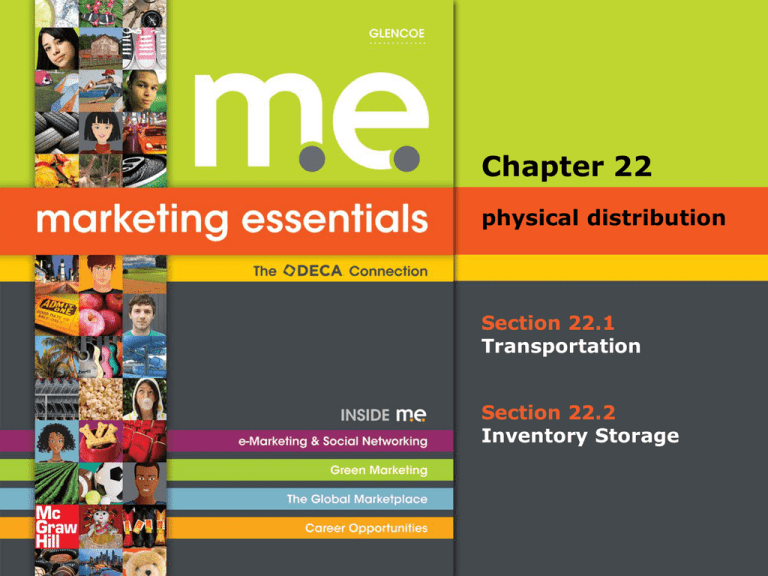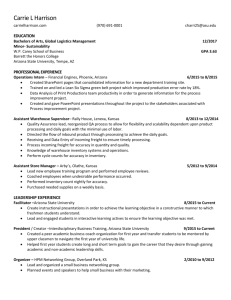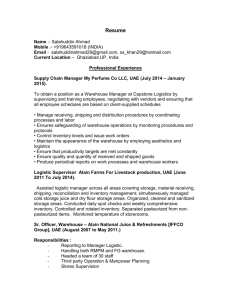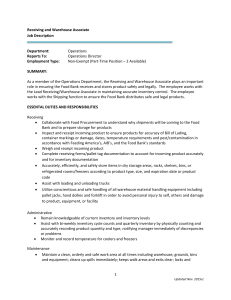Transportation
advertisement

Chapter 22 physical distribution Section 22.1 Transportation Section 22.2 Inventory Storage Section 22.1 Transportation CONNECT What channels of transportation are used to deliver your favorite products to you? Section 22.1 Transportation • Describe the nature and scope of physical distribution. • Identify transportation systems and services that move products from manufacturers to consumers. • Name the different kinds of transportation service companies. Section 22.1 Transportation Success in today’s business environment requires companies to deliver products efficiently and effectively to their customers around the world. Section 22.1 Transportation • physical distribution • exempt carriers • transportation • ton-mile • common carriers • carload • contract carriers • freight forwarders • private carriers Section 22.1 Transportation Advantages and Disadvantages of Each Type of Transportation System Section 22.1 Transportation Advantages and Disadvantages of Each Type of Transportation System Section 22.1 Transportation The Nature and Scope of Physical Distribution Physical Distribution Key link between a business and its customers Goods can be stored in convenient locations Also known as logistics Each link in the system affects the other links Needs to be as efficient and cost effective as possible physical distribution Activities for delivering the right amount of product to the right place at the right time. Section 22.1 Transportation The Nature and Scope of Physical Distribution Three Factors Affecting Transportation Costs Section 22.1 Transportation The Nature and Scope of Physical Distribution Three Factors Affecting Transportation Costs Section 22.1 Transportation Types of Transportation Systems Percentage of Freight Shipped by Each Type of Single-Mode Transportation in the United States Section 22.1 Transportation Types of Transportation Systems Trucking common carrier Trucking company that provides transportation services to any business in their operating area for a fee. Types of Carriers Common Carriers Contract Carriers Private Carriers Exempt Carriers contract carrier A for-hire trucking company that provides equipment and drivers for specific routes, per agreements between the carrier and the shipper. private carrier A trucking company that transports goods for an individual business. exempt carrier A trucking company that is free from direct regulation of rates and operating procedures. Section 22.1 Transportation Types of Transportation Systems Relationship Among the Different Types of Carriers Section 22.1 Transportation Types of Transportation Systems Relationship Among the Different Types of Carriers Section 22.1 Transportation Types of Transportation Systems Advantages of Truck Transportation Disadvantages of Truck Transportation Convenient door-to-door delivery Cost more than rail and water carriers Rapid delivery reduces the need for large inventories Susceptible to delays Section 22.1 Transportation Types of Transportation Systems Trains transport nearly 15 percent of the total ton-miles of freight shipped in the United States. Rates charged for less-than-carload shipments are more expensive. ton-mile Movement of one ton (2,000 pounds) of freight one mile. carload Minimum number of pounds of freight needed to fill a boxcar. Section 22.1 Transportation Types of Transportation Systems Advantages of Railroad Transportation Low cost Requires less energy than motor carriers Seldom slowed by bad weather Disadvantages of Railroad Transportation Lack of flexibility of delivery locations Section 22.1 Transportation Types of Transportation Systems Advantages of Marine Shipping Low cost Disadvantages of Marine Shipping Slow Freight must be off-loaded onto railroad cars or motor carriers Affected by bad weather Section 22.1 Transportation Types of Transportation Systems Advantages of Pipelines Low operational costs Safety record Low instances of damage or theft Not subject to weather delays Disadvantages of Pipelines Leaks can damage the environment Section 22.1 Transportation Types of Transportation Systems Advantages of Air Cargo Services Disadvantages of Air Cargo Services Speed High cost Reduced inventory expenses and storage costs Mechanical breakdowns Weather delays Section 22.1 Transportation Transportation Service Companies U.S. Postal Service Express Delivery Service Bus Package Carriers Freight Forwarders freight forwarder A private company that combines less-than-carload or less-than-truckload shipments from several businesses and delivers them to their destinations. Section 22.1 Transportation Transportation Service Companies Descriptions of Each Type of Transportation Service Company Section 22.1 Transportation Transportation Service Companies Descriptions of Each Type of Transportation Service Company Section 22.1 Transportation Section 22.1 1. Explain why transportation is related to customer service. Transportation is related to customer service because choosing the right mode of transportation can make a product more affordable for a customer or can make the product more desirable (for example, if it arrives faster or on time.) Section 22.1 Transportation Section 22.1 2. Differentiate between common, contract, and private carriers. Common carriers provide truck transportation services to any business in their operating area for a fee. Contract carriers are for-hire trucking companies that provide equipment and drivers for specific routes, according to agreements between the carrier and the shipper. Private carriers transport goods for an individual business. Section 22.1 Transportation Section 22.1 3. List the benefits of intermodal transportation. Intermodal transportation such as piggyback or fishyback services combine the advantages of truck transportation with the lower costs of rail and marine transportation. Section 22.2 Inventory Storage CONNECT How might the law of supply and demand relate to inventory storage? Section 22.2 Inventory Storage • Explain the concept and function of inventory storage. • Identify the types of warehouses. • Discuss distribution planning for international markets. Section 22.2 Inventory Storage Inventory storage allows a business to keep its products in a safe location until they are needed or ready to be sold. Section 22.2 Inventory Storage • storage • private warehouse • public warehouse • distribution center • bonded warehouse Section 22.2 Inventory Storage Notes About Different Types of Warehouses Section 22.2 Inventory Storage Notes About Different Types of Warehouses Section 22.2 Inventory Storage The Storage of Goods Storage Facilitates the movement of products through the distribution channel as products are sold Products are stored until sold Products are stored if production exceeds consumption Products are stored safely and securely at convenient locations Storage adds time and place utility to products Internet-based stores require warehouse space storage The holding of goods until they are sold. Section 22.2 Inventory Storage The Storage of Goods Types of Warehouses Private Warehouse Public Warehouse Distribution Center Bonded Warehouse private warehouse A storage facility designed to meet the specific needs of its owner. public warehouse A storage and handling facility offered to any individual or company that will pay for its use. distribution center A warehouse designed to speed delivery of goods and to minimize storage costs. bonded warehouse A public or private warehouse that stores products requiring payment of a federal tax. Section 22.2 Inventory Storage The Storage of Goods Name the Types of Warehouses Section 22.2 Inventory Storage The Storage of Goods Name the Types of Warehouses Section 22.2 Inventory Storage The Storage of Goods Five Types of Public Warehouse Bulk Storage Warehouses Cold Storage Warehouses General Merchandise Warehouses Commodity Warehouses Household Goods Warehouses Section 22.2 Inventory Storage The Storage of Goods Trace a Product Through the Entire Distribution Center Cycle Section 22.2 Inventory Storage Distribution Planning for International Markets Distribution Planning for International Markets Requires more planning Export and import laws Conflicting bureaucratic regulations Language barriers Complex negotiations Foreign transportation systems are different with mixed reliability Section 22.2 Inventory Storage Distribution Planning for International Markets Define These Trade Barriers Section 22.2 Inventory Storage Distribution Planning for International Markets Define These Trade Barriers Section 22.2 Inventory Storage Section 22.2 1. Explain the four reasons why merchandise is stored. Students should list any four of these reasons for storing merchandise: facilitate delivery to purchaser, production has outpaced demand, products require seasonal storage, to take advantage of quantity purchases, and to be located close to purchasers. Section 22.2 Inventory Storage Section 22.2 2. List three services that might be offered at a public warehouse. Students should list any three of these services that might be offered at a public warehouse: shipment consolidation, receiving, unloading, inspecting, reshipping, order filling, and truck terminal operation services. Section 22.2 Inventory Storage Section 22.2 3. Describe a bonded warehouse. A bonded warehouse can be either a public or private warehouse that stores products that require the payment of a federal tax. Products cannot be removed until the required tax is paid. End of Chapter 22 physical distribution Section 22.1 Transportation Section 22.2 Inventory Storage




